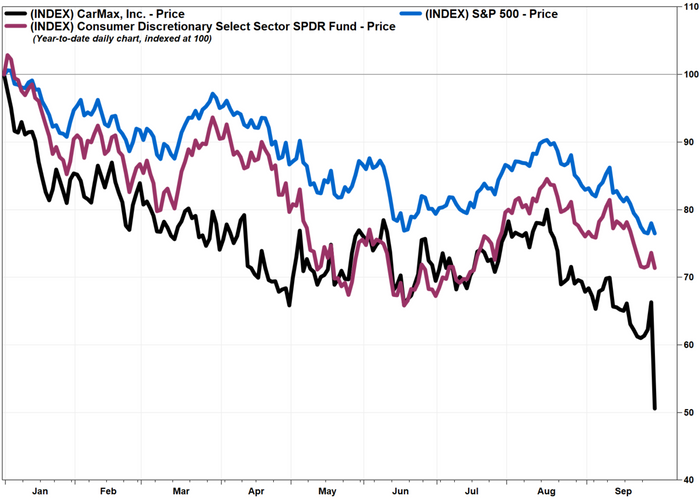CarMax Inc. investors were enduring the worst day in more than 20 years on Thursday, after the used-car retailer missed earnings expectations by a wide margin, citing “affordability” challenges stemming from inflation and low consumer confidence.
The stock
KMX,
tumbled 23.9% in midday trading, on track for the biggest one-day percentage decline since its record 28.1% plunge on Jan. 20, 2000. It was by far the worst performer in the S&P 500 index
SPX,
on Thursday, and was headed for the lowest close since April 2020.
“Macro factors, including vehicle affordability that stem from persistent and broad inflation, climbing interest rates and low consumer confidence all led to a marketwide decline in used auto sales,” said Chief Executive Bill Nash on a post-earnings conference call with analysts, according to a FactSet transcript.
Net income for the quarter to Aug. 31 fell to $125.9 million, or 79 cents a share, from $285.3 million, or $1.72 a share, in the same period a year ago. That was well below the FactSet consensus for earnings per share of $1.39.
Revenue increased 2% to $8.14 billion, below the FactSet consensus of $8.54 billion. Meanwhile, cost of revenue increased more than revenue, rising 3.3% to $7.41 billion to knock gross margin down to 9.05% from 10.21%.
CEO Nash said he believed sales were hurt by a “shift” in what consumers prefer to spend their money on, from large purchases to smaller discretionary items. In response, Nash said the company continued to offer a higher mix of lower-priced vehicles, which also hurt margins.
Total vehicle unit sales fell 10.3% to 376,616, but the average price for a used vehicle increased 9.6% to $28,657 and the average wholesale-vehicle price jumped 17% to $10,179.
Comparable-store used vehicle unit sales dropped 8.3%, compared with the FactSet consensus for a 3.6% decline.
Nash said the second-quarter started with a “low-single-digit” percentage decline in comparable-store sales. But then sales “fell sharply” at the beginning of July, with August sales ending with a “midteens” percentage decline.
Chief Financial Officer Enrique Mayor-Mora said on the analyst call that the company “pulled additional levers” to align expenses with the lower sales levels.
“This included further reducing staffing through attrition in our stores and CECs [customer experience centers], pausing on a portion of the hiring and contractor utilization in our corporate offices, as well as better aligning marketing spend to sales,” Mayor-Mora said.

FactSet, MarketWatch
CEO Nash ended the prepared remarks section of the call by assuring Wall Street that the challenges won’t last: “As I close, I want to reiterate that while the market conditions and consumer behaviors are challenging, we believe that these pressures are transitory and that our foundation remains strong.”
CarMax stock has plummeted 49.5% year-to-date, while the SPDR Consumer Discretionary Select Sector exchange-traded fund
XLY,
has slid 28.6% and S&P 500 has shed 23.5%.



